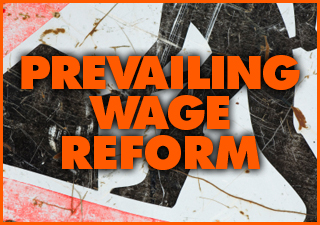Media
Pop Quiz: Would You Pay $126 or $84 for the Same Product?
 Yesterday, we noted how Pennsylvania’s prevailing wage law is a “rent” for labor unions. Here’s an example of how it plays out in real life—when our schools are hit with higher construction costs because of the mandate. So, pop quiz: Would you pay $84 or $126 for the exact same product?
Yesterday, we noted how Pennsylvania’s prevailing wage law is a “rent” for labor unions. Here’s an example of how it plays out in real life—when our schools are hit with higher construction costs because of the mandate. So, pop quiz: Would you pay $84 or $126 for the exact same product?
When it comes to Pennsylvania’s “prevailing wage” law, we force the taxpayers to pay $126. That’s precisely what happened to taxpayers in the South Western School District in York County. But instead of it being $126 and $84, it was $126,825 instead of $84,504.
You see, when the South Western School District needed some roof repairs, the initial proposal from the contractor came in at $84,504. However, prior to obtaining Board approval, business officials inquired as to whether the proposal had used prevailing wage rates since the total cost of the project exceeded $25,000. The contractor indicated that the initial proposal did not include the artificially increased wage rates. He had used the wages being paid on a similar project in the private sector, like the roof of a large office building.
The contractor resubmitted the proposal for the exact same scope of work and included the payment of prevailing wages. Guess what: The total cost of the project increased from $84,504 to $126,825! That’s an increase of $42,321, or 50 percent, for exactly the same product with the same skilled workers. The only difference is that the taxpayers in South Western School District got a 50 percent higher tax bill for the same work.
Thank goodness we taxpayers don’t have to pay so-called “prevailing wages” on all the labor that government purchases from contractors. For example, when the state contracts with technology companies, law firms, food service companies or office supply vendors, we don’t mandate certain wage levels for computer techs, lawyers, food servers or Staples employees. So why do we do it only for public construction jobs?
The short answer is this is what happens when the Union Party controls Pennsylvania state government rather than the Taxpayer Party. Of course, we should end such unnecessary mandates such as prevailing wage entirely, but until the Taxpayers have a majority in the Pennsylvania General Assembly, we should at least increase the prevailing wage threshold from $25,000 to $185,000.